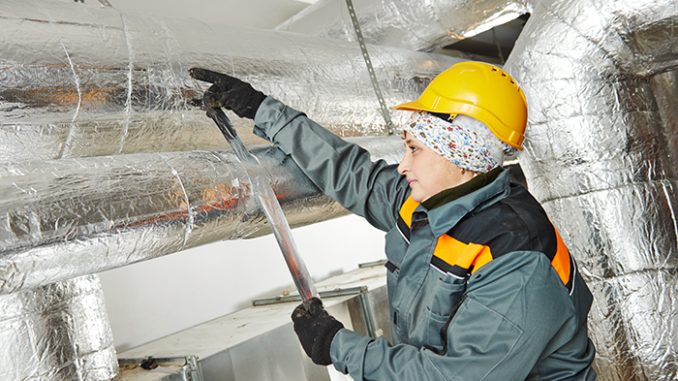
The Association d’isolation du Québec (AIQ) is preparing to launch its Quality Assurance Certificate (QAC) program this fall before handing it over to TIAC for national distribution
By / Jessica Kirby
When the BCICA announced its quality assurance control program to the TIAC board of directors nearly a deacde ago, members of the AIQ were immediately interested. “There has been a decline in quality on projects in Quebec over the last ten years,” says AIQ member and Advisor to the TIAC Board, Remi Demers. “This kind of program is exactly what we have been looking for to help with that.”
The AIQ’s program, called Programme Assurance Qualité (PAQ)/Quality Assurance Certificate (QAC), is modelled after the BCICA’s program, which launched in 2014 and has served as an important case study that has informed the AIQ’s process.
Under the AIQ’s QAC program, contractors—who must be AIQ members—will price the QAC in their bids subject to an amount designated by the QAC chart and not exceeding 3% of the bid amount. If the contractor is successful, he or she sends a copy of the contract to the AIQ office. The AIQ will assign a quality controller (QC) to the project, and this certified individual will make site vistis, monitor quality of the job, and report to the engineer on the final work and any issues that arise.
“The controller will be a second set of eyes for the engineer, but he or she doesn’t replace the engineer’s responsibilities,” says Demers. “Insulation is only 1% of the job, but it can cause up to 10% of the problems if it isn’t a quality job. The controller will be on site to guide the contractor and report to the engineer.”
The process begins with a meeting between the contractor, engineer, owner, and controller to establish the project requirements, such as ensuring adequate space is left for appropriate insulation thicknesses.
“Space can be a big problem,” Demers says. “If the project requires two inches of insulation but there is only 1.5 inches of space between pipes, the insulation can’t be applied properly.”
When the insulation scope begins, the controller tells the owner how many site visits will occur over the life of the project. If the controller identifies a problem with the insulation scope on the first visit, he or she will send a fact-based report about the issue to the engineer and mechanical contractor. The engineer will issue a directive on correcting the issue.
“If the controller returns a second time and the problem is still occurring, he or she will have to return a third time at the insulation contractor’s expense,” says Demers. “This is all to make sure the contractor remains committed to the quality the program demands.”
Contractors will also receive eight hours of online instruction about insulation quality, the QAC program, what to expect from the quality controller, and how the process works from start to finish.
“We want contractors to be aware of the problems that exist on some jobsites, and we want to prepare them for being inspected,” Demers says. “Every company should have one person—a superindendent or a foreman—take the course so they are prepared and know what quality control is all about.”
The quality controller training program was developed by the QAC steering committee in consultation with Denis Beaudin, TIAC’s former technical consultant. Beaudin prepared a 475-page booklet on insualtion quality assurance, which the committee handed over to Ahuntsic College, which will deliver the training and whose faculty pared the original document down to around 300 pages.
The course will comprise 50 hours of online instruction and a four- to six-hour in-person test where participants will be presented with an on-site scenario they will have to review and prepare a report on. The first 20 spaces in the quality controller training program will be open for registration this fall.
“This is a program for the controllers, but also a good course for people who want to learn more about insulation,” Demers says. “We expect those 20 spaces will be filled with controllers in training and other people with a vested interest in understanding insulation systems, such as members of engineering firms and people working in distribution.”
Over the next three months, the AIQ and a marketing consultant will promote the program to engineering firms with the prime objective of having specifers name the QAC in their master specifications.
The program’s infrastructure was developed by the BCICA, but the AIQ’s intention was to create a program that can be accessed at the national level by each province. It will be developed in French, and provincial associations who wish to adopt the program can adjust the parameters to suit their jurisdictions and will be responsible for any translation costs incurred.
“We learned a lot from Chris Ishkanian and the BCICA,” Demers says, “including that we may need to be patient as the program catches on. We know of four smaller engineering firms that want to write the QAC into their master specifications, and we know larger firms will eventually want to take this on, but for now they will have questions. Changing a master spec can take months of work and committee consultation, so we are looking at working with the companies that have shown interest so far as soon as the program launches and working with more firms as they work through their processes.”
Demers expects that engineers who write the program into their specs will follow the AIQ’s process on implementing and enforcing the program, while some contractors may object at first.
“There are some contractors who may fight it, but to be an AIQ member, they have to sign an ethics statement,” he says. “This is part of upholding that commitment to the AIQ’s mandate.”
The next steps begin with Ahuntsic College promoting the program over the summer. From August to October, three AIQ ambassadors—Steve Huculiak, Mathieu Hamel, and Jean-Francois Tessier—will promote the program to engineering firms. During the same period, AIQ and Ahuntsic College will prepare the mock-ups of insulation failures at the college’s mechanical room for the final on-site exam. The first 50-hour course will be delivered October 19 to November 16, and the first practical, on-site exam will be delivered November 23. The AIQ hopes to deliver its first QAC jobs in January 2023.
“Every member of TIAC will benefit from this,” Demers says. “We are very excited to share this with TIAC and see how it develops at the national level.”
Demers says a program like this has the potential to change more than just the quality of installations.
“Over the years, we have seen companies do things the easy way or the ‛way things have always been done’ because they want to cut corners,” Demers says. “This has to change. Jobs used to go to the lowest bidder but now, if you don’t have the money to do the job properly, you won’t get the work. The quality will be there, and contractors will be proud of the job they do.
“It is a change and it may be a challenge, but it will make the industry better for everyone in the long run.”
Learn more about the AIQ at | isolation-aiq.ca ▪



